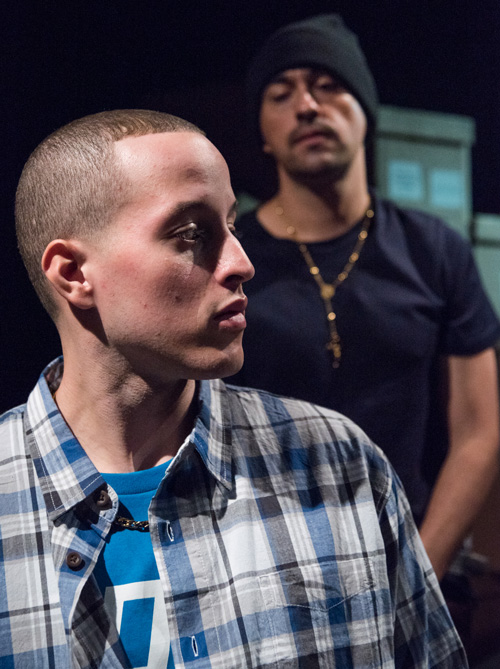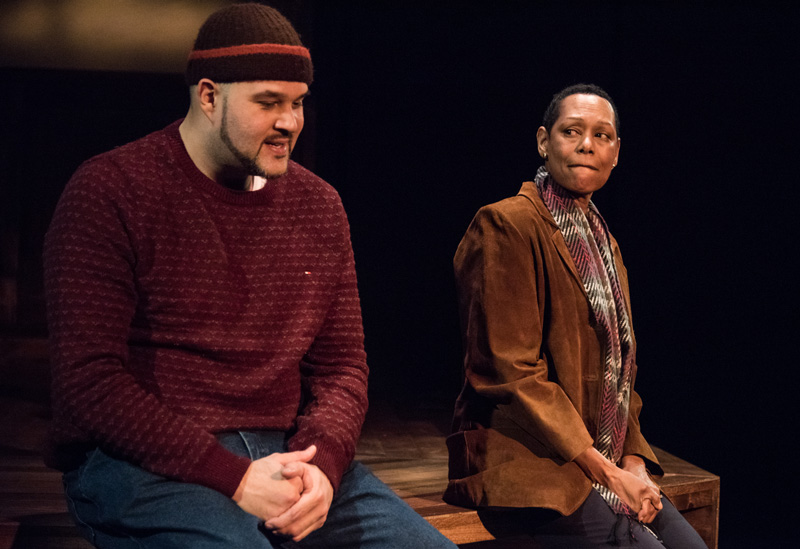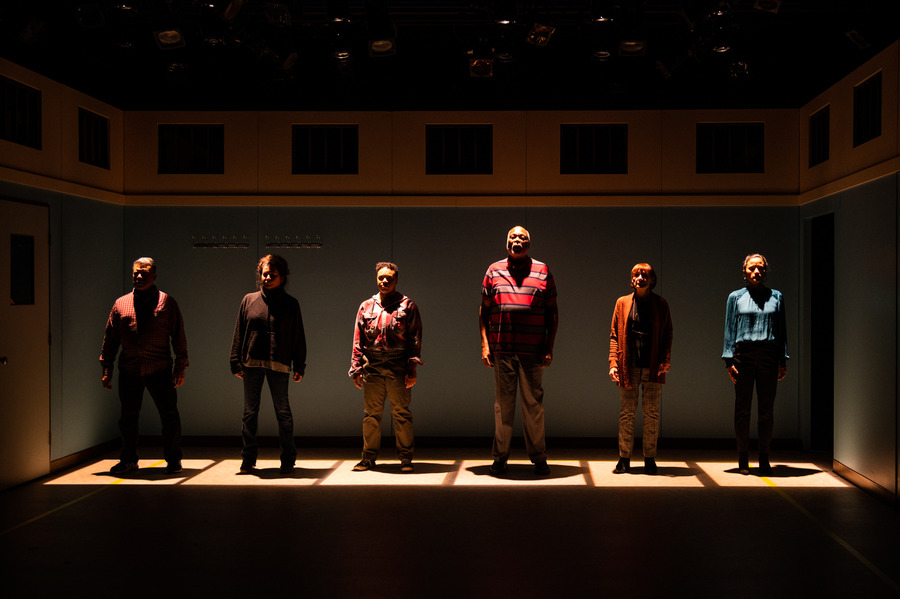Roll up your sleeves, unbutton, unzip, show some skin, open up, spread your legs, bare your soul. Nothing is private and nothing is sacred when you’re standing in line at a prison like Rikers Island. Shared Sentences, a debut play by Houses on the Moon co-founder and artistic director Emily Joy Weiner (now at 122 Community Center’s 2nd Floor Theater in New York City through Nov. 12), examines what it means to show up for the people you love.
Centered around the members of the fictional United Prison Families (UPF) support group, the play is inspired by the experiences of real-life members of Prison Families Anonymous, a group co-founded by author and activist Barbara Allan and advocate Julia Lazareck. Shared Sentences asks the question: How do the loved ones of incarcerated folks make the most out of lives which involve frequent trips to the post office, money transfers at the Western Union, daily scheduled phone calls, legal aid paperwork, and regular treks on the Q100 or long car rides upstate?

There’s Olivia (Emily Joy Weiner), a newcomer struggling to adjust to life on prison’s schedule following her boyfriend’s recent arrest; Tee (Nikomeh Anderson), a transitioning teen whose mother’s battle with addiction keeps her on a steady rotation between halfway houses and jail cells; Sebastian (David Anzuelo), a bartender who lords over the community aux cord, determined to have his disabled brother’s sentence overturned; Celeste (Yadira De La Riva), a no-nonsense paralegal studying to take the LSAT a third time, while visiting her aging father at Rikers and trying to keep her sons from being pulled into an intergenerational incarceration cycle; Harold (Raphael Nash Thompson), a family man devoted to reconnecting with his wife after her release from a 10-year sentence; and Barbara (Glynis Bell), the fearless leader of the support group who struggles to keep it all together.
The play explores the complicated dynamics of race, class, experience, education, and privilege among these six individuals, who are brought together by shared trauma and who become stronger by leaning on each other. The personal melds with the political, such that it no longer matters what anyone is “in for,” where they come from, or if they’ve been “raised well.” At the end of the day, none of these characters is prepared for the byzantine rules, emotional labor, and red tape that come with having an incarcerated loved one. As Celeste says, “You hope, but don’t expect.”
This experience is sadly all too common. According to the Mayor’s Management Report from Sept. 2022, New York City has an average daily inmate population of 5,559 individuals, with an average individual stay of 120 days. Detainees are allowed three one-hour visits per week with loved ones; sentenced individuals are allowed just two one-hour visits a week, Wed. through Sun., according to the city’s revised visit schedule. And incarceration is not just a local issue but a national problem: The Federal Bureau of Prisons reports that there are 122 prisons operating throughout the U.S., housing an estimated 2 million people, and the number of affected family members can be extrapolated from there.
Playwright and performer Weiner had firsthand experience with this dilemma, and knew it was a subject she wanted to develop into a show with Houses on the Moon, which for more than two decades has staged the stories of under-served communities.
“I reached out to some orgs and people that I already knew through other work we’ve done, but also new places to connect with on this project,” Weiner said. This led her to Allan’s Prison Families Anonymous, which in turn connected her with sources for interviews and workshops. She soon found that folks in these groups had a lot of common experiences and a shared vocabulary. “I could say ‘Western Union’ and these other people would go, ‘Oh my goodness!’ We all knew that. I have a list of words that we developed together, like an alphabet of things that have very specific meanings to us. That’s how it started.”
This kind of meaning-making is par for the course with the company’s development process. Houses on the Moon regularly partners with organizations that actively serve the communities whose stories they tell onstage. In this case, it was social justice organizations like the Fortune Society, the Osborne Association, and Prison Families Alliance. For such previous works as 2007’s De Novo, the story of a teenage boy fleeing gang violence, or 2004’s Tara’s Crossing, the story of a transgender woman from Guyana, the company studied asylum cases, interviewed immigration attorneys, and worked with human rights organizations like the American Friends Service Committee, Amnesty International, and Human Rights First.


The company’s work goes all the way back to the late 1990s, when Weiner and Houses co-founder Jeffrey Solomon were working together at the Queens School for Career Development, a school for young adults with developmental disabilities. To counter the rampant homophobia of the time, Weiner and Solomon set out to make a theatre project that spoke to LGBTQ+ students and educators. That project, which came from research on international gay youth sites and interviews with young people and educators, many of whom were closeted, grew into a performance pice called Building Houses on the Moon.
The evocative title came from an interview with a lesbian teenager from New Haven, Conn., who, when asked about her role models, said she had none. Weiner recalled, “She said, ‘It’s like asking to imagine your future taking place on the moon. How can I picture what my house would look like on the moon? I’ve never been to the moon. Nobody’s ever tried to build a house at such low gravity. How do I know whether to picture trees and grass or just rocks?’”
This metaphor became central to the theatre company’s mission, and they took it as their name. Houses on the Moon was founded in 2001 with a mission to dispel ignorance and isolation through the theatrical amplification of unheard voices. Through creative workshops, original performances, post-show conversations, and accessible ticketing, Houses on the Moon seeks to unite communities through the public sharing of untold stories.
The company has a subsidized ticket program, with 30 percent of all tickets given to community organizations or individuals with a direct connection to the theme of the play. For Shared Sentences, Houses on the Moon is providing tickets to folks who have an incarcerated family member or have been incarcerated themselves, in addition to giving tickets to organizations that work with those populations. The company also hosts two to three student matinees for each production, where they fill the whole theatre with students from various schools throughout the city. This is an important part of Houses’ mission to reach audiences beyond those who regularly make and see theatre.
The seeds for Shared Sentences go back to 2017, when Houses on the Moon was developing Camilo Almonacid’s The Assignment, a play about gun violence inspired by a unique relationship that blossomed during the theatre company’s workshop process: A mother who founded a youth violence prevention program after her teenage son was murdered in a street fight made friends with a man whose 17 years in prison for manslaughter led him to education and rehabilitation.

The resulting play was “not about them, but it was exploring that relationship,” said Weiner. “It was a gorgeous play. And through that process, I met a lot of people who worked in the criminal justice system, such as David Rothenberg from the Fortune Society and many others. And it took me back to a place in my own life.”
More than a decade ago, Weiner’s partner at the time was incarcerated. “I’m going back many years to when this was my own personal experience,” she said. “I was sort of thrown into trying to stay connected with him and support him. I didn’t know anything about how to do that. And during that time, what I did was, I journaled all the time. I just wrote, because every visit—every trip to the post office, every day trying to be there to get the calls, and also manage my own life, trying to have the finances to support him for what he needed, as well as to take care of myself—just everything was overwhelming. And I journaled, journaled, journaled, and then I put all that aside; my life moved forward. Although it doesn’t go away. Once you experience something like that, it stays with you, and you change; you become different in how you see the world. That’s what happened to me.”
Weiner spent most of 2018 and 2019 gathering and curating material from interviews and workshops with family members of incarcerated individuals. It was Fortune Society’s David Rothenberg who connected her with Prison Families Anonymous. “When I told him what I wanted to do, he said, ‘Oh well, you can’t do a play about family members of the incarcerated without Barbara Allan.’ He was right.” Weiner met Allan at a book signing for her memoir, Doing Our Time on the Outside and found her “so impressive and lovable. We really clicked, and she told me right up front that she was completely in on helping me develop this project, whatever it would be. She’s been part of it from the beginning.”
Weiner attended some of Allan’s virtual support group meetings during the pandemic, in addition to spending time with her and talking to group members one on one.
“The tie-in between what she’s done for over 50 years with her support circle, and what happened in our little group of these creative workshops—it was kind of a reflection of the same thing,” Weiner recalled. “It became clear that this was the inspiration for the play, what that group does and how that group works.”

It was no easy task to narrow down the countless stories and experiences shared by the participants in these groups into a 95-minute play. And while Weiner recognizes that Shared Sentences cannot possibly encapsulate every family’s experience with incarceration, there are sure to be some familiar faces and moments that resonate onstage.
“There were particularly four people from the beginning of this project that were part of it, through the interviews and the creative workshops, that stayed consistent with me,” Weiner said. “I needed their essence to be in this play, for three reasons: 1. Because of their commitment to the project and their passion for having their stories told, 2. Because their stories are so interesting, and 3. Just because of deep love.” Those four are represented in the characters of Harold, Barbara, Tee, and Celeste, all four of whom are credited for their contributions and are receiving a percentage of the show’s ticket revenue.
With much encouragement and writing advice from veteran playwright Craig Lucas, Weiner completed an earlier draft of Shared Sentences, which in 2021 had a week-long workshop followed by a public reading at Theater Row in Manhattan, and then a public presentation at the Quick Center in Fairfield, Conn. When new-play savant Lisa Rothe came on to direct, the pieces all came together.
Though the production closes on Nov. 12, this is far from the end of the road for Shared Sentences.
“The plan is, we want to take this to as many places as we can,” Weiner said. “Including non-traditional theatre settings, which we do a lot with our work. It’s an equal part of our work, just as important as putting up a production here that people can come to, that we also take it to communities that maybe can’t as easily access or come to the theatre to see it. That entails hospitals, sometimes libraries, community centers, universities, high schools, and regional theaters. We want to tour with this and reach as many people as we can.”
The next project for Houses on the Moon in the fall of 2023 will be Hotel Happy by Camilo Almonacid, which will use puppetry to explore the sex tourism industry and U.S. military involvement in Bogotá, Colombia.
Whether the subject is trauma, addiction, poverty, stress, or injustice, the overarching message of Houses on the Moon’s work is that life’s burdens are easier to shoulder when they’re shared. Theatre can be a home for anyone who is searching, from here to the moon and back.
Alexandra Pierson (she/her) is associate editor of American Theatre. apierson@tcg.org


